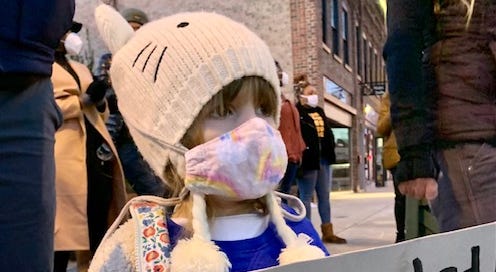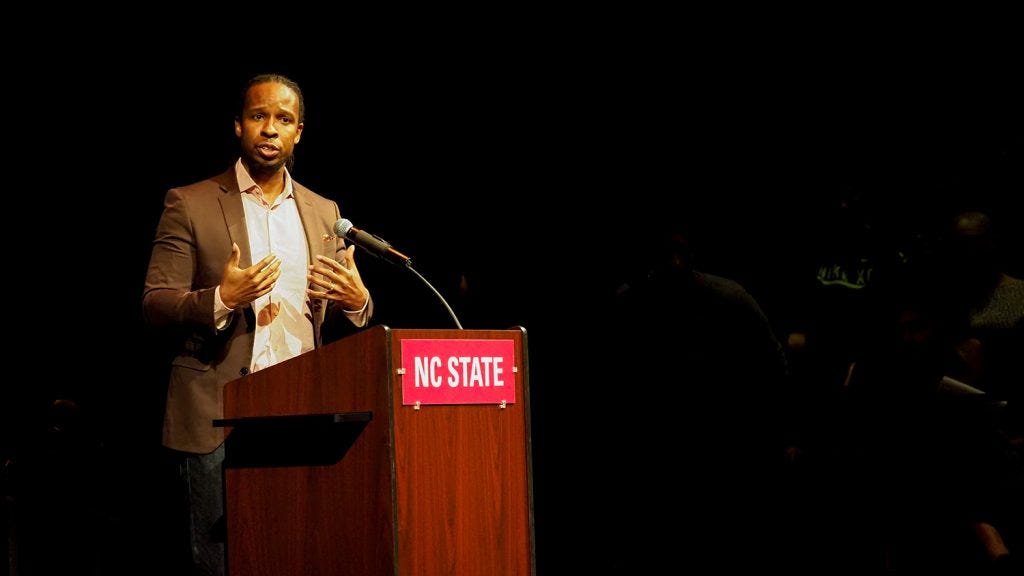The last large in-person NC State event I attended before the pandemic was a talk by Ibram X. Kendi, National Book Award winning-author (the youngest winner ever in nonfiction), MacArthur Fellow, professor of history and founder and director of the the Boston University Center for Antiracist Research. Dr. Kendi was not there to talk about his bestselling, award-winning Stamped from the Beginning or How to Be an Antiracist, but to talk about the deliberate right-wing erasure and distortion of Martin Luther King Jr.’s work and legacy.
I remember sitting next to my now-colleague Cadwell Turnbull, who was visiting to give a job talk, and looking across the aisle to see several of my creative writing students attending with my colleague Cat Warren. Dr. Kendi spoke without notes for about 45 minutes, deconstructing so many of the accepted ideas about Dr. King—that he believed in colorblindness, that he was an assimilationist, that the pinnacle and endpoint of his work was his “I Have a Dream” speech, given on the steps of the Lincoln Memorial in 1963.
This, as Kendi points out in a recent essay, “The Second Assassination of Martin Luther King Jr.,” is nothing new. A third of Americans polled in April 1968, the same month King was assassinated, felt that he had “brought it on himself.”
In 1986, Ronald Reagan—whose administration was responsible for so much racist policy, and whose bigotry has been continuously softened by the press and by politicians—commemorated the first federal Martin Luther King Jr. Day by evoking the “dream” of “colorblindness.” As Kendi writes, “Reagan abandoned government efforts to eliminate racial inequities, and constantly evoked King to justify his abandonment.”
Last year, in my we-thought-it-was-blue (or at least purple) home state of Virginia, businessman Glenn Youngkin ran an abhorrently racist campaign while also evoking Dr. King. The night before the election, he quoted King’s “I Have a Dream” speech at a rally before launching into his campaign centerpiece—an attack on Critical Race Theory, and a promise to ban it, along with mask mandates, from public schools.
Yesterday, his first day in office (and with a dangerous winter storm approaching), he signed eleven executive actions. The first two? Prohibiting the teaching of Critical Race Theory and the use of “divisive concepts” in K-12 schools and prohibiting school boards from protecting kids and teachers by enacting mask mandates. (Number nine was withdrawing Virginia from the Regional Greenhouse Gas Initiative.)
It pains me to see my home state, where my brother teaches history and my nephew has just started kindergarten, going so dangerously backwards. It scares me to think that all it takes is applying a sheen of “not-racist” to a clearly racist man who feels absolutely no shame invoking a civil rights hero he either doesn’t understand or willfully distorts. As Kendi writes:
The second assassination of King is the latest assassination of history. The war on science, on expertise, on facts, on journalism, on democracy necessitates a concomitant war on history. And the war on history is the war on education—as history is essentially educational. If an anti-racist King can be turned into a color-blind conservator of racism, then anyone and anything from history can be assassinated. Pro-slavery Founding Fathers can be recast as having been “against slavery.” Racist Confederate rebels can be recast as “not racist” heroes deserving of monuments in town squares.
I’m reminded that from 1984 to 2000 (throughout my K-12 education), Virginia celebrated Lee-Jackson-King Day. Both Alabama and Mississippi still celebrate “King-Lee” day (yes, that’s a holiday celebrating both Confederate General Robert E. Lee and Martin Luther King Jr.). Virginia kept a separate “Lee-Jackson Day” until 2020.
This is not a quirk of the South. Just as Youngkin’s campaign was not, as he claimed, an attempt to ease and heal divisions. It’s deliberately, strategically divisive, anti-factual, and dangerous. And as Dr. Kendi points out, it all goes together—this war on facts, science, knowledge, democracy, public health, the environment.
I hope we can be together safely, in person, at universities and public spaces again in the near future to hear speakers like Dr. Kendi.
In the meantime you can see these highlights from a MLK address he gave last year at the University of Rochester.
And watch this 1967 interview with Martin Luther King Jr. that Kendi references, in which he speaks about our “many more difficult days ahead” and against the war in Vietnam:
And please check out the amazing Virtual MLK Project housed at NC State.
I hope you’re all safe and warm and ready for tomorrow, Frog Troublers.






Thank you for this!
Awesome Belle and Bea and Harriet and Richard ! thank you so much